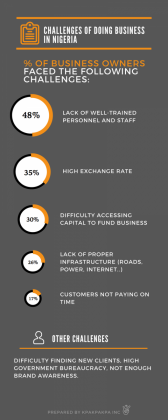I remember telling my uncle about my interest in manufacturing and he looked at me and said: “Anyone that wants to do manufacturing in Nigeria has to have the heart of a lion”. Basically, you have to be strong to be in this industry.
nbsp;This is because, in addition to the problems that plague businesses in Nigeria, and Africa in general, there are some challenges that are specific to the manufacturing industry.
I have spent time working with and interviewing manufacturers in Nigeria and Ghana, and here are six challenges facing manufacturing in Nigeria and Ghana (in no particular order):
- Financing
Depending on what stage you are in your business – you could just be thinking about making your own product or you might have started producing and want to expand your operations. Whatever the case is, you will need some money to kickstart and continue your operations. Unfortunately, money is not readily available for manufacturers in this region. When finances do become available through bank loans, the interest rates are very high (25% – 40%). At such rates, a good amount of the profit made by manufacturers is used to pay debts to the banks.
- Operations & Management.
When running a business, you want to do two things – maximize your profit by increasing your revenue and minimizing your costs. It’s that simple. The same goes for running a factory, a plant or a small-scale operation in your home. To achieve this, a factory has to operate efficiently – maximize its production output and minimize the energy used for production. This is an issue with a lot of manufacturers in Africa – they do not utilize practices that make them operate efficiently. Processes such as production forecasting, inventory management, and continuous process improvements are some of the practices that are not employed in Nigeria and other African countries. If you have not read this yet, check out this amazing book that can help you understand how to improve efficiencies in your factory: “The Goal: A process of ongoing improvement“
- Lack of Properly trained workers
A factory is only as good as the people that run the factory. There is a lack of properly trained employees that have the management skills to manage a factory. Besides the difficulty in finding good managers, there is also a lack of talent base that possesses technical skills to perform efficiently in a factory. These skills are needed to operate machinery and build high-quality products that have the same attention-to-detail as products made outside Nigeria. The difficulty in finding properly trained staff is not unique to manufacturers in Nigeria. We surveyed over 100 business owners in Nigeria and the number one challenge they face is finding quality talent.

- Infrastructural issues
I can’t talk about the issues facing all businesses in this region without talking about infrastructural challenges. The main issue that hinders manufacturers is the access to uninterrupted power supply. The use of alternative power such as Diesel generators in Nigeria and Ghana increases the cost of production by a magnitude which discourages manufacturers. Should the government grant manufacturers license to generate their own power? Other infrastructural issues include bad roads, poor storage facilities. These all extend the time it takes for a manufactured product to get into the hands of the consumer.What do you think about Solar Energy for manufacturing in Nigeria
- Distribution & Logistics
Manufacturers that do not have well-established distribution channels usually have difficulty selling their products. The retailers in Nigeria will sometimes demand that manufacturers or wholesalers pay them ahead of time to stock their goods at its retail outlet. This can be very discouraging to the SMEs that are just starting their business and do not have the proper distribution channel to get the product to market.
- Marketing & Branding
Lastly, and this ranks high as one of the main issues for local manufacturers – the fact that people perceive locally-made products as inferior to imported ones. If the people that are supposed to be buying the goods do not see the product as valuable, then it will be hard convincing them to buy it. I see this as a marketing and branding issue – a lot of awareness has to be created so that products of the same quality are seen to be as valuable as their imported counterparts. Some strides have been made to improve the perception of locally-made goods with the recent Buy Naija To Grow The Naira campaign. However, there is still some way to go to make Nigerian-made goods competitive in the global market.


